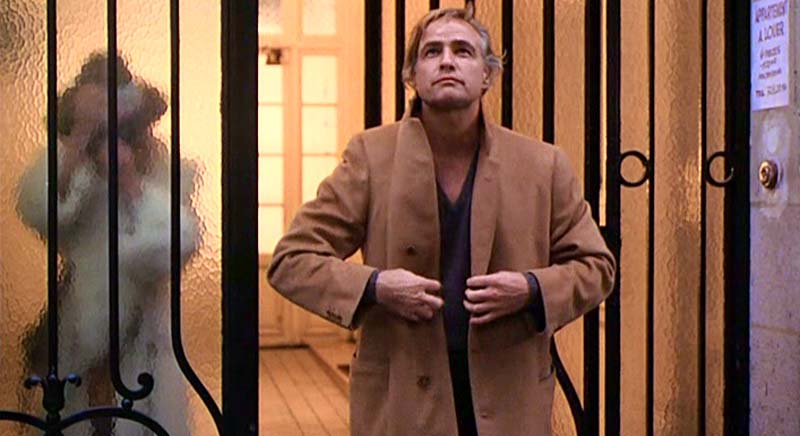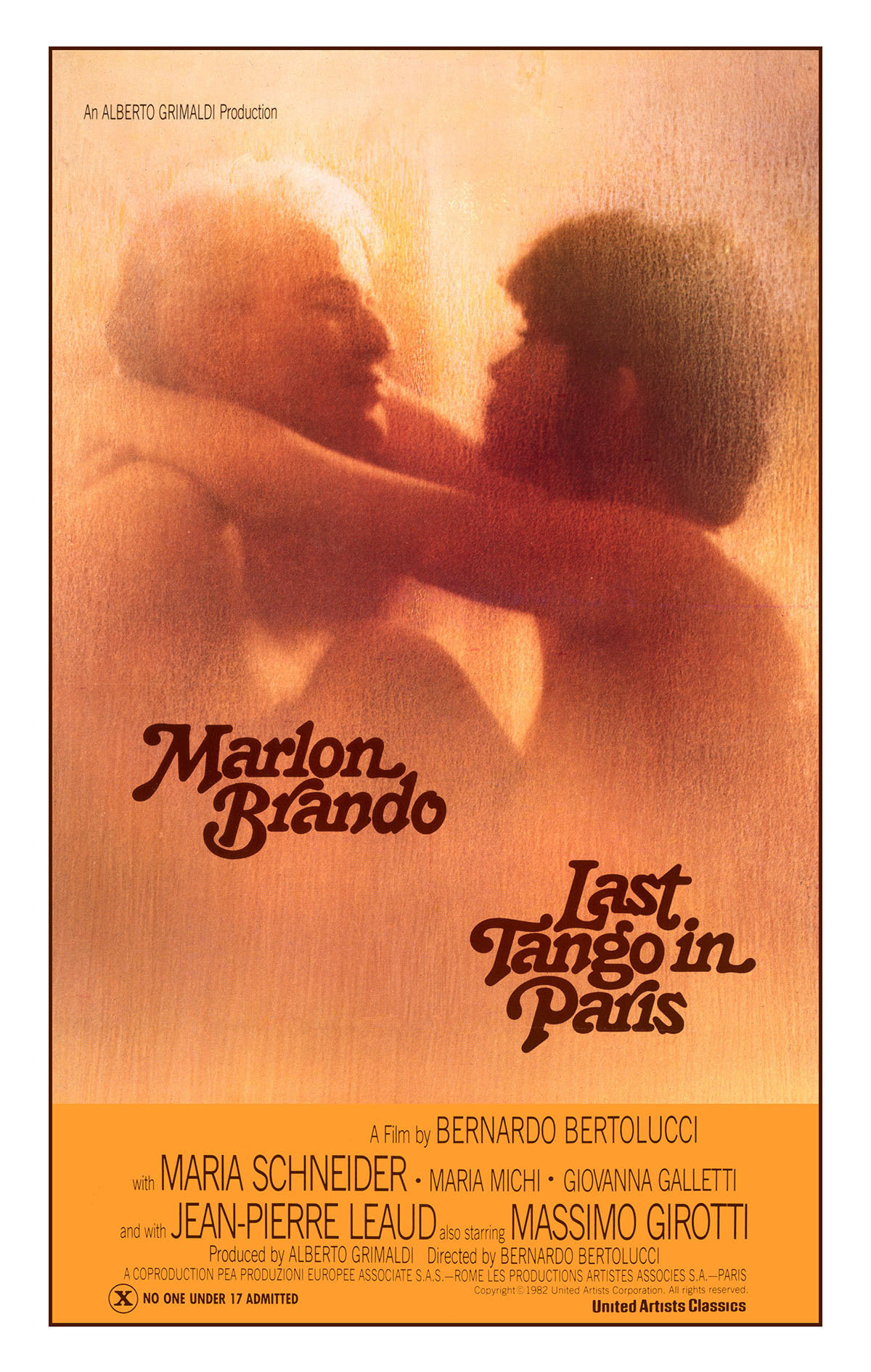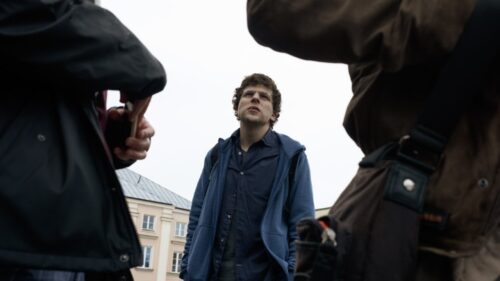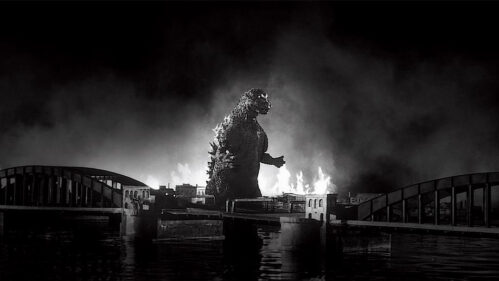Intimate strangers in the night

Reviewing " Last Tango in Paris " in 1972, I wrote that it was one of the great emotional experiences of our time, adding: "It's a movie that exists so resolutely on the level of emotion, indeed, that possibly only Marlon Brando , of all living actors, could have played its lead. Who else can act so brutally and imply such vulnerability and need?"
Now it is 2004 and Brando is dead. As I looked at the film yet again, Brando's most powerful scene resonated for me in an unexpected way. The scene where he confronts the body of his wife, who has committed suicide, and mourns her in an outpouring of rage and grief. "I may be able to comprehend the universe, but I'll never understand the truth about you," he says. He calls her vile names, then is torn by sobs. He tries to wipe off her cosmetic death mask ("Look at you! You're a monument to your mother! You never wore makeup, never wore false eyelashes."). He doesn't understand why she killed herself, why she abandoned him, why she never really loved him in the first place, why he was always more of a guest in her hotel than a husband in her bed.
As I watched this scene, I was struck by a strange notion. I watched it again, this time imagining that Brando was talking to his own dead body -- that his anger and love, his blame and grief, were directed toward himself. I'm sure Bernardo Bertolucci , the film's director, did not have this in mind, and of course I cannot know what Brando was thinking. But here was a man who sometimes prostituted his own talent, who frustrated his admirers by seeming to scorn them, whose "eventual monstrous obesity seemed a clear sign of his hatred for Hollywood," as Stanley Kauffmann wrote in the best of the Brando obituaries. This was the greatest movie actor of his time, the author of performances that do honor to the cinema, and yet as Kauffmann notes, he was driven to disparage the profession of acting, which was the instrument of his genius.
His wife in " Last Tango in Paris " owned and ran a little hotel. "It's kind of a dump, but not completely a flophouse," he says, but the film clearly shows it as a place where prostitutes bring their clients. So he was living off a woman who lived off whores. "I moved in for one night and stayed five years," he muses. Can this refer to his love-hate for Hollywood, for acting, for his own career, for the waste he was sometimes compelled to make of his talent? Is it himself that he'll never understand the truth about?
We cannot know. These ideas exist in my mind, and it is wrong to place them in Brando's. But such a narcissistic actor never held more love and grief for anybody else than he held for himself, and I say that not as an insult but as a way of explaining his power: In his best performances, he is sorry for himself. We see the wounded little boy -- quite clearly, for example, in the monologue in "Last Tango" recalling his character's childhood. Yes, at the end he was fat. A lot of people get fat. But what a thing to happen to Marlon Brando. How better to destroy an actor's vanity, how better to force us to admire him for himself and not because Stanley Kowalski looked sexy in a torn T-shirt? Did he eat as he did out of self-pity, because he felt he deserved to, because he felt deprived?
The history of " Last Tango in Paris " (1972) has and always will be dominated by Pauline Kael. "The movie breakthrough has finally come," she wrote, in what may be the most famous movie review ever published. "Bertolucci and Brando have altered the face of an art form." She said the film's premiere was an event comparable to the night in 1913 when Stravinsky's "The Rite of Spring" was first performed and ushered in modern music. As it has turned out, "Last Tango" was not a breakthrough but more of an elegy for the kind of film she championed. In the years since, mass Hollywood entertainments have all but crushed art films, which were much more successful then than now. Although pornography documents the impersonal mechanics of sex, few serious films challenge actors to explore its human dimensions; isn't it remarkable that no film since 1972 has been more sexually intimate, revealing, honest and transgressive than "Last Tango"?
The film begins when Paul (Brando) and Jeanne ( Maria Schneider ) meet in a Paris apartment they are both considering renting. Paul, we will learn, is planning a move from his dead wife's hotel. Jeanne is planning marriage with Tom ( Jean-Pierre Leaud ), an insipid young director. Within moments after they meet, Paul forces sudden, needful sex upon her. It would be rape were it not that Jeanne does not object or resist, makes her body available almost with detachment. Indeed, it is rape in Paul's mind, Paul's sexual release seems real, here and throughout the film, but we are never sure what Jeanne feels during their sex. Although she cries during the famous "butter scene," she is not crying about the sex and indeed doesn't seem to be thinking about it.
Paul insists on "no names," no personal histories. Their meetings in the apartment are not dates but occasions for sex, which he defines and she accepts. The pairing of the 20-year old girl and the unkempt 45-year-old man seems unlikely, but Bertolucci enriches it through their extraordinary dialogue. Brando and Schneider seem natural and spontaneous. Their conversations are rare in not seeming written, not seeming to point to a purpose or conclusion; they are the sorts of things these people might really say, and it's remarkable how relaxed, even playful and sweet, Paul can be with her, when he is not dictating their brutal sexual couplings (at no point can they be said to "make love").
Schneider's performance has been discounted over the years. This is said to be Brando's film. "Both characters are enigmas," I wrote in 1995, "but Brando knows Paul, while Schneider is only walking in Jeanne's shoes." Seeing the film again, I believe I was wrong. Schneider, who plays much of the film completely nude, who is held in closeup during long scenes of extraordinary complexity, who at 22 had hardly acted before, shares the film with Brando and meets him in the middle. What Hollywood actress of the time could have played Brando on his own field?
In 1995 I wrote: "He is in scenes as an actor, she is in scenes as a thing." Wrong again. They are both in scenes as actors, but I was seeing her as a thing, fascinated by the disconnect between her adolescent immaturity and voluptuous body. I objectified her, but Paul does not, and neither does the movie. That he keeps his secrets, refuses intimacy, treats her roughly, is explained by the scene with the body of his wife, and perhaps by his own experience of sex.
When I interviewed her in 1975, Schneider said she and Brando improvised the bathroom scene -- the scene where he shaves while they talk. Brando always liked to have something to do with his hands, some kind of business, and here their dialogue is as close to overheard real conversation as it is probably possible to come. They even misspeak from time to time. There are little pauses and disconnects. The conversation seems to be finding its way.
In a film posited on two characters remaining strangers, Bertolucci and his actors achieve a kind of intimacy the movies rarely approach. Real behavior is permitted; in a scene with his wife's lover Marcel, Paul coughs, and we sense that is Brando actually coughing, and accepting that he has coughed, and that in other movies actors never cough, except when it is in the screenplay.
The film is not perfect. The character of Tom is a caricature that only grows more distracting over the years. Leaud, the star of Truffaut's autobiographical films, behaves not as if he is a movie director, but as if he's playing one -- not in this film but in another film, maybe a musical comedy. The dialogue between Tom and Jeanne seems unnatural and forced. We don't believe it, and we don't care.
What happens in the apartment between Paul and Jeanne is what the movie is about: How sex fulfills two completely different needs. Paul needs to lose himself to mourning and anger, to force his manhood on this stranger because he failed with his wife. Jeanne responds to a man who, despite his pose of detachment, is focused on her, who desperately needs her (if for reasons she does not understand). He is the opposite of Tom, who says he wants to film every moment of her life, but is thinking of his film, not of her. Jeanne senses that Paul needs her as she may never be needed again in all of her life. Her despair at the end is not because of lost romance, but because Paul no longer seems to need her.
Then there is the closing sequence, in which Paul abandons the behavior of the empty room, reveals his name, tells her about his life, seems to desire her in the banal way a middle-age man might desire a sexy girl. That changes everything. Is it plausible, what she does to him when he follows her into her mother's apartment? I don't know, but I know the movie could not end with both of them still alive. Much has been said about Brando's death scene in " The Godfather ," but what other actor would have thought to park his chewing gum before the most important moment of his life?


Roger Ebert
Roger Ebert was the film critic of the Chicago Sun-Times from 1967 until his death in 2013. In 1975, he won the Pulitzer Prize for distinguished criticism.
Last Tango in Paris

- Marlon Brando as Paul
- Maria Schneider as Jeanne
- Jean-Pierre Leaud as Tom
Written and Directed by
- Bernardo Bertolucci
Leave a comment
Now playing.

Small Things Like These

Bird (2024)

Meanwhile on Earth

Christmas Eve in Miller's Point

Stockholm Bloodbath

The Last Rifleman

Weekend in Taipei

Youth (Homecoming)

The Piano Lesson
Latest articles.


Time Moves On: Jesse Eisenberg on "A Real Pain"

A Voice from the Great Unconscious: Tony Todd (1954-2024)

"Arcane" Makes Triumphant Return to Netflix

Tokyo International Film Festival 2024: Godzilla Turns 70
The best movie reviews, in your inbox.
Log in or sign up for Rotten Tomatoes
Trouble logging in?
By continuing, you agree to the Privacy Policy and the Terms and Policies , and to receive email from the Fandango Media Brands .
By creating an account, you agree to the Privacy Policy and the Terms and Policies , and to receive email from Rotten Tomatoes and to receive email from the Fandango Media Brands .
By creating an account, you agree to the Privacy Policy and the Terms and Policies , and to receive email from Rotten Tomatoes.
Email not verified
Let's keep in touch.

Sign up for the Rotten Tomatoes newsletter to get weekly updates on:
- Upcoming Movies and TV shows
- Rotten Tomatoes Podcast
- Media News + More
By clicking "Sign Me Up," you are agreeing to receive occasional emails and communications from Fandango Media (Fandango, Vudu, and Rotten Tomatoes) and consenting to Fandango's Privacy Policy and Terms and Policies . Please allow 10 business days for your account to reflect your preferences.
OK, got it!
- About Rotten Tomatoes®
- Login/signup
Movies in theaters
- Opening This Week
- Top Box Office
- Coming Soon to Theaters
- Certified Fresh Movies
Movies at Home
- Fandango at Home
- Prime Video
- Most Popular Streaming Movies
- What to Watch New
Certified fresh picks
- 93% Heretic Link to Heretic
- 94% Small Things Like These Link to Small Things Like These
- 84% Bird Link to Bird
New TV Tonight
- 100% Silo: Season 2
- 90% The Day of the Jackal: Season 1
- 100% Say Nothing: Season 1
- 84% Yellowstone: Season 5
- 81% Cobra Kai: Season 6
- -- Cross: Season 1
- -- Bad Sisters: Season 2
- -- St. Denis Medical: Season 1
- -- The Creep Tapes: Season 1
- -- It's All Country: Season 1
Most Popular TV on RT
- 100% Arcane: League of Legends: Season 2
- 95% The Penguin: Season 1
- 77% Disclaimer: Season 1
- -- Don't Come Home: Season 1
- 94% The Diplomat: Season 2
- 83% Agatha All Along: Season 1
- 100% Lioness: Season 2
- 100% From: Season 3
- Best TV Shows
- Most Popular TV
Certified fresh pick
- 90% The Day of the Jackal: Season 1 Link to The Day of the Jackal: Season 1
- All-Time Lists
- Binge Guide
- Comics on TV
- Five Favorite Films
- Video Interviews
- Weekend Box Office
- Weekly Ketchup
- What to Watch
Best TV Shows of 2024: Best New Series to Watch Now
Best Movies of 2024: Best New Movies to Watch Now
What to Watch: In Theaters and On Streaming.
Awards Tour
Dune: Prophecy First Reviews: Like Game of Thrones in Space, but Weirder
Weekend Box Office: Venom Is Tops Again Over Lackluster Weekend
- Trending on RT
- Gladiator II First Reviews
- Holiday Programming
- Nosferatu Reactions
- Verified Hot Movies
Last Tango in Paris
Where to watch.
Rent Last Tango in Paris on Fandango at Home, or buy it on Fandango at Home.
What to Know
Naturalistic but evocative, Last Tango in Paris is a vivid exploration of pain, love, and sex featuring a typically towering Marlon Brando performance.
Critics Reviews
Audience reviews, cast & crew.
Bernardo Bertolucci
Marlon Brando
Maria Schneider
Jean-Pierre Léaud
Darling Legitimus
Catherine Sola
TV Script Girl
More Like This
Related movie news.

Last Tango in Paris reviewed: ‘the fur is going to fly’ – archive, 1972
20 November 1972 : Marlon Brando gives his best performance for 20 years in Bertolucci’s startling new film
H aving already broken my self-imposed rule about not writing about the New York film festival (of which I am director) in discussing the new Buñuel, I might as well break it again to report on our world premiere of the new Bertolucci film: Last Tango in Paris .
It was something of an event. Pauline Kael, a lady who does not often lose her cool, wrote in the New Yorker “Last Tango in Paris was presented for the first time on the closing night of the New York film festival … that should become a landmark in movie history comparable to 29 May 1913 – the night Sacre du Printemps was first performed – in music history. There was no riot, and no one threw anything at the screen,” conceded Miss Kael, “but I think it’s fair to say that the audience was in a state of shock, because the film has the same kind of hypnotic excitement as the Sacre, the same primitive force and the same thrusting, jabbing eroticism. The movie breakthrough has finally come.”
By which she means that at last a director has come along and used the “new permissiveness” to make a film about sexuality which is both intelligent and moving. Part of the shock came from the fact that much of the film is in English: Marlon Brando can, and does, speak French, but the key scenes were in our own language, and they were spoken by nothing less than a household name. Furthermore, it was generally conceded that he was giving his best performance in 20 years. This was no mere “character part” as in The Godfather, but the real thing.
More than that, he spoke, for the first time in film history, the way people do about sex when they’re having it, and during much of the film, that is just what he and Maria Schneider are doing. The variety and explicitness (too explicit to recount in a family newspaper) of their sexual encounters also drew gasps.
I have used the phrase “having sex” because that is what they are doing – they are not making love, at least not at first. Brando plays an American in Paris whose wife has just committed suicide. He meets a young girl while they are both flat hunting, and he launches a purely sexual relationship with her. No names, no addresses, no past – those are his ground rules. The couple are to meet only in the flat, and they are never to talk about their outside life. The girl (brilliantly played by newcomer Maria Schneider) at first fights the idea, but gradually gives in. The twist, of course, is that as time passes, it is he who grows dissatisfied with the arrangement; her reaction is as unpredictable as it is quickly seen to be inevitable.
The film is based on an original script by Bertolucci and Kim Arcalli (who has also been Bertolucci’s editor in his last three films), but Bertolucci modified the original script to fit the actors in much the same way Renoir did in Rules of the Game. Bertolucci’s original choices for the two main roles were Jean-Louis Trintignant and Dominique Sanda. But the film as it stands now could never have been played by those two. In the same way, Renoir, after casting his film, began to modify it by bringing the documentary method into fiction film-making. Long before the term was invented, Renoir was creating his own kind of cinéma vérité in which the film is almost as much a documentary on the actors as it is a story.
And this is also a film about Marlon Brando and the American tough-guy ideal he has so completely incarnated over the years. When Paul begins to talk about his childhood, Bertolucci abandoned his script and trained his camera on Brando who begins to improvise, and in fact tells us about his own childhood.
But apart from the film’s many qualities (and I have been able to sketch in only a few of them) there was a special air of excitement that night because there was some doubt if anyone who wasn’t there would ever see the film in its original form. Although shot entirely in Paris, it is an Italo-French co-production, and as such, if it is to benefit from all that the Italian system offers in the way of subsidies etc, it cannot be exported before it is passed by the Italian censorship board.
An exception was made for the New York film festival, but the print was whisked in and out of the country too fast for there to be more than the one solitary screening – there was not even a press show. At the same time, the producer Alberto Grimaldi, flew in a half dozen Italian journalists; the idea is that the Italian censorship board is very responsive to foreign opinion. It is generally agreed that Pasolini’s Canterbury Tales would never have got past them if it had not first won the Grand Prize in Berlin.
There are no prizes in New York, but the closing night spot is much sought after, and those journalists had plenty to write home about. Whether it will work, we shall know in the next few months. Both producer and director are adamant that they will allow no cuts to be made.
What they always can do if the Italian censors don’t pass the film is to surrender the film’s nationality; it may cost them a little, but they would surely make it up on the film’s American release. But where else can it be shown? Germany, Scandinavia – yes. But France or England: I wonder. It is certainly the best possible test for a censor; everyone here agreed the film is not pornographic. On the other hand, it is graphic and explicit. In fact, it poses something of a quandary. But I dare say it will be solved eventually: Last Tango is manifestly too important a film to be put on the shelf. Meanwhile, the fur is going to fly.
- Last Tango in Paris
- From the Guardian archive
- Marlon Brando
- Bernardo Bertolucci
Comments (…)
Most viewed.

IMAGES